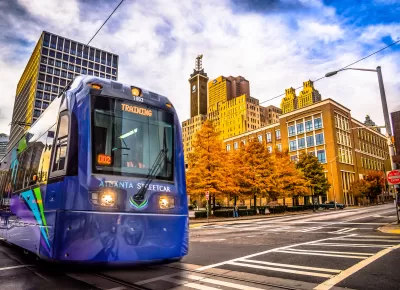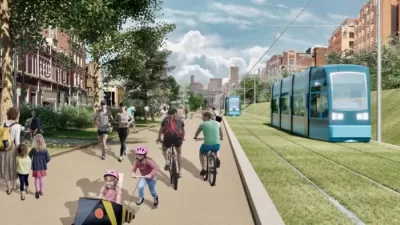After a stumbling start getting off the ground, proponents of Atlanta's new streetcar see hope in its future while others question further investment.

Atlanta's new streetcar system has had a rough go of it early on. Critics have called the 2.7-mile system a "colossal waste of taxpayer dollars" after it failed to reach ridership goals, with others complaining that the homeless "had turned the streetcars into sleek-looking shelters." Now as Atlanta begins charging fares for riders, some believe that ridership is set to take a nose dive. Alan Blinder reports in the New York Times that the mayor and other supporters of the streetcar are asking for patience as the system works out its kinks, but they believe the investment is worth it.
Streetcar boosters, who lament what they perceive as prematurely hostile coverage by news outlets and say they are encouraged by the first year’s ridership statistics, acknowledge that the existing route is insufficient. But they contend that proposed expansions in future decades would help the system appeal to more people than the visitors whose hotels are often near the current line.
The steady opposition to the streetcar has some backers worried that federal funding for future expansion could be in jeopardy, but critics think the money could be spent better elsewhere. Blinder quotes one of the leading opponents: "Let’s view this as a lesson, and let’s consider better options that don’t involve taking a lane away from the downtown roads."
FULL STORY: Atlanta Begins Charging for a Streetcar Named Undesirable by Some

Planetizen Federal Action Tracker
A weekly monitor of how Trump’s orders and actions are impacting planners and planning in America.

Maui's Vacation Rental Debate Turns Ugly
Verbal attacks, misinformation campaigns and fistfights plague a high-stakes debate to convert thousands of vacation rentals into long-term housing.

Restaurant Patios Were a Pandemic Win — Why Were They so Hard to Keep?
Social distancing requirements and changes in travel patterns prompted cities to pilot new uses for street and sidewalk space. Then it got complicated.

In California Battle of Housing vs. Environment, Housing Just Won
A new state law significantly limits the power of CEQA, an environmental review law that served as a powerful tool for blocking new development.

Boulder Eliminates Parking Minimums Citywide
Officials estimate the cost of building a single underground parking space at up to $100,000.

Orange County, Florida Adopts Largest US “Sprawl Repair” Code
The ‘Orange Code’ seeks to rectify decades of sprawl-inducing, car-oriented development.
Urban Design for Planners 1: Software Tools
This six-course series explores essential urban design concepts using open source software and equips planners with the tools they need to participate fully in the urban design process.
Planning for Universal Design
Learn the tools for implementing Universal Design in planning regulations.
Heyer Gruel & Associates PA
JM Goldson LLC
Custer County Colorado
City of Camden Redevelopment Agency
City of Astoria
Transportation Research & Education Center (TREC) at Portland State University
Jefferson Parish Government
Camden Redevelopment Agency
City of Claremont





























